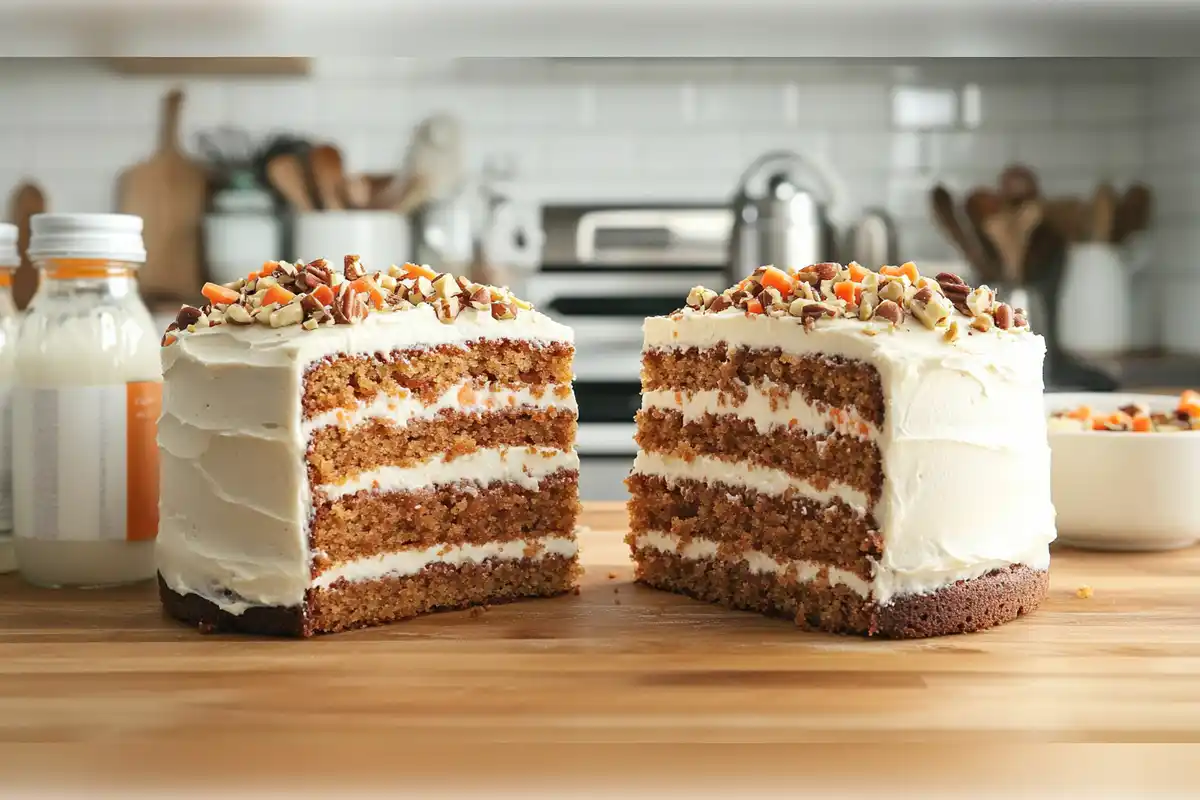Carrot cake is beloved for its moist texture and rich flavor, but a debate continues to swirl among bakers: Is it better to use oil or butter in carrot cake? The answer to this question largely depends on what texture and flavor you want to achieve. Both oil and butter serve different purposes in baking, and when it comes to carrot cake, the choice of fat can dramatically impact the cake’s outcome.
In this article, we’ll explore the key differences between using oil and butter in carrot cake, how each ingredient affects moisture and texture, and provide insights on which option may be the best for your perfect carrot cake.
Part 1: The Role of Fats in Baking: Oil vs. Butter
Fats like oil and butter are critical components in baking, providing moisture, texture, and flavor. However, the type of fat you use can make a big difference. Butter is made up of both fat and water. When butter is creamed with sugar, air is trapped, creating a lighter, fluffier texture. On the other hand, oil is 100% fat, which means it doesn’t trap air but does provide a much denser and moister texture.
So, which is better for carrot cake? Most traditional recipes for carrot cake use oil because it enhances the cake’s moistness and ensures a denser texture.
Why Oil is Traditionally Used in Carrot Cake
Carrot cake stands out from many other cakes because of its unique, moist texture. This is largely due to the combination of oil and the natural moisture provided by grated carrots. When baking carrot cake, the goal is to achieve a dense, rich texture without making the cake too heavy. Oil is perfect for this because it helps retain moisture throughout the baking process.
Unlike butter, oil is neutral in flavor, which allows the spices in carrot cake—such as cinnamon, nutmeg, and the sweetness of the carrots—to take center stage. Butter, on the other hand, can sometimes overpower these flavors with its rich, creamy taste. To learn more about why butter isn’t the preferred fat in traditional carrot cake recipes, check out our in-depth explanation on why butter is not used in carrot cake.
Additionally, oil-based cakes tend to stay moist longer than butter-based cakes. This means that your carrot cake will still taste fresh even after being stored for a few days. This long-lasting moisture is one of the reasons why carrot cake made with oil is a popular choice for events and gatherings.
The Case for Butter: Can You Use Butter in Carrot Cake?
While oil is the traditional fat used in carrot cake, it’s possible to use butter as well. Butter can add a rich, creamy flavor that oil cannot provide. However, using butter will affect both the texture and moisture of the cake. Butter-based cakes are generally lighter and fluffier because of the air that is trapped during the creaming process.
If you prefer a lighter texture in your carrot cake, butter could be a good option. However, you should be prepared for a less moist cake than what you’d get with oil. The flavor profile will also shift, with the richness of butter taking over some of the more subtle spice notes. For an excellent recipe to try, you can refer to this simple carrot cake recipe and experiment with substituting butter for oil.
Moisture and Texture Comparison: Oil vs. Butter in Carrot Cake
When comparing oil and butter, the biggest differences come down to how each affects the moisture and texture of the cake. Here’s a detailed breakdown:
- Oil in Carrot Cake:
- Creates a dense and moist cake that stays fresh longer.
- The oil doesn’t trap air, so the cake remains heavy, but this is ideal for carrot cake, where the texture should be hearty.
- Because oil is 100% fat, it locks in moisture throughout the baking process.
- Butter in Carrot Cake:
- Results in a lighter, fluffier cake because butter can trap air when creamed with sugar.
- The flavor of butter is rich and can complement sweeter, richer cakes, but it may overshadow the spices and carrots in the cake.
- Butter contains water, which evaporates during baking, so butter-based cakes can dry out more quickly than oil-based ones.
For other types of cakes, like sponge or vanilla cake, butter is often the preferred fat because of the air-trapping properties and its flavor. But for carrot cake, oil wins the battle in terms of creating a moist, dense texture.
Best Recipes – Carrot Cake with Oil vs. Carrot Cake with Butter
Now that we’ve explored how oil and butter affect the texture and flavor of carrot cake, let’s look at some tried-and-true recipes. Both options offer distinct results, so depending on your personal preference, you may find yourself drawn to one method over the other.
Classic Carrot Cake Recipe with Oil
This is a traditional carrot cake recipe using oil, resulting in a dense, moist cake that stays fresh for days.
Ingredients:
- 2 cups all-purpose flour
- 2 cups sugar
- 1 ½ cups vegetable oil
- 4 large eggs
- 3 cups grated carrots
- 1 tsp baking soda
- 1 tsp cinnamon
- 1 tsp vanilla extract
- Optional: walnuts, raisins
Instructions:
- Preheat your oven to 350°F (175°C).
- In a large bowl, mix together the flour, sugar, baking soda, and cinnamon.
- In a separate bowl, whisk the oil and eggs together until well combined.
- Gradually mix the dry ingredients into the wet ingredients, then fold in the grated carrots and any optional ingredients like walnuts or raisins.
- Pour the batter into a greased pan and bake for 45-50 minutes, or until a toothpick inserted in the center comes out clean.
- Let the cake cool completely before frosting.
This recipe results in a rich, moist carrot cake where the flavor of the spices and carrots is front and center, thanks to the neutral flavor of the oil.
Carrot Cake Recipe with Butter
If you prefer a lighter, fluffier texture, this carrot cake recipe uses butter for a more airy finish.
Ingredients:
- 2 cups all-purpose flour
- 1 ½ cups sugar
- 1 cup unsalted butter, softened
- 4 large eggs
- 3 cups grated carrots
- 1 tsp baking powder
- 1 tsp cinnamon
- 1 tsp vanilla extract
- Optional: pecans, raisins
Instructions:
- Preheat the oven to 350°F (175°C).
- In a large bowl, cream together the butter and sugar until light and fluffy.
- Add the eggs one at a time, beating thoroughly after each addition.
- Gradually add the dry ingredients (flour, baking powder, and cinnamon) to the butter mixture, then stir in the grated carrots and any optional mix-ins.
- Pour the batter into a greased pan and bake for 40-45 minutes, or until a toothpick comes out clean.
- Let the cake cool before frosting.
With butter, the result is a cake that’s a bit lighter in texture but slightly less moist. The rich, buttery flavor comes through, offering a different taste experience compared to oil-based cakes.
Expert Opinions and User Preferences
Bakers and experts are often split between using oil or butter in carrot cake. Many traditionalists argue that oil is the best choice for achieving a moist, dense texture. On the other hand, those who prefer a lighter, more cake-like texture may opt for butter.
According to various baking experts, oil is generally preferred for carrot cake because it helps maintain moisture for longer periods. It also allows the flavors of the carrots and spices to shine without being overpowered by the richness of butter.
However, some home bakers prefer butter for its flavor-enhancing qualities. If you’re making carrot cake for a special occasion and want a richer taste, butter might be the right choice. Ultimately, it comes down to personal preference and what you’re looking to achieve in terms of flavor and texture.
FAQs About Oil vs. Butter in Carrot Cake
Can I substitute oil for butter in carrot cake?
Yes, you can substitute oil for butter, but expect the texture and moisture levels to change. Oil will make the cake denser and moister, while butter will make it lighter but less moist.
What type of oil is best for carrot cake?
Vegetable oil or canola oil are the most common choices for carrot cake because they are neutral in flavor. You can also experiment with coconut oil for a slightly tropical twist, though it may slightly alter the flavor.
How do I make carrot cake lighter and fluffier?
If you prefer a lighter texture, use butter instead of oil. Butter traps air when creamed with sugar, creating a fluffier cake. However, be aware that the cake may not be as moist as it would be with oil.
What’s the difference between using butter and oil in cakes?
The primary difference is in texture and moisture. Butter adds richness and creates a lighter texture, while oil provides moisture and results in a denser, heartier cake. Butter can add a more pronounced flavor, while oil keeps the focus on the other ingredients.
Does using butter affect the flavor of carrot cake?
Yes, butter will add a slightly richer, more savory flavor to the cake compared to the neutral flavor of oil. This can enhance certain elements, but it may also mask the delicate flavors of the carrots and spices.
Conclusion
So, is it better to use oil or butter in carrot cake? It depends on what you’re looking for in the finished product. If you want a classic, moist carrot cake with rich spices and subtle sweetness, oil is the way to go. However, if you prefer a lighter, fluffier cake with a rich, buttery taste, then butter could be the better option.
For those who can’t decide, we recommend trying both recipes to see which one aligns with your preferences. Whether you choose oil for its moisture-retaining properties or butter for its richness, you’ll end up with a delicious carrot cake that is sure to be a hit!

